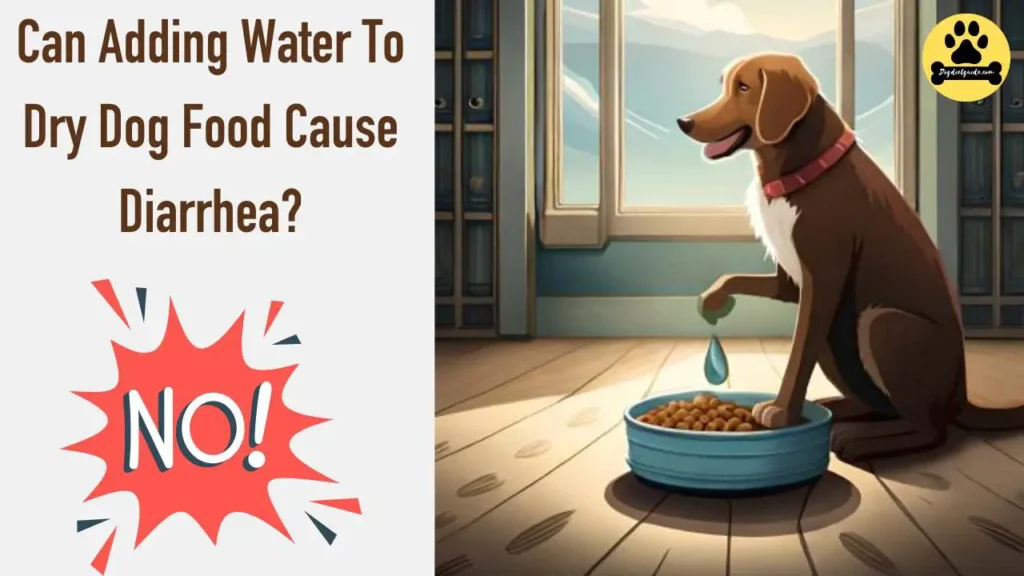Many pet owners commonly add water to dry dog food to enhance its appeal to their pets or ensure that their furry companions stay well-hydrated. But does this seemingly harmless practice have side effects, such as causing diarrhea in dogs?
Can Adding Water To Dry Dog Food Cause Diarrhea?
No, it’s just a myth that adding water to kibble dog food causes diarrhea in dogs. Adding moderate amount of water to dry dog food doesn’t cause diarrhea in healthy dogs. Adding water to dry kibble helps ensure that your pet stays well-hydrated. However, some canines may have sensitive stomachs or food allergies, making them more prone to digestive issues.
Many dog owners add water to dry kibble to make it easier for their dogs to chew and digest. Adding water can also help ensure your furry friend stays well-hydrated, especially if they need more water.
However, some puppies may have sensitive stomachs or food allergies, making them more prone to digestive issues.
If you suddenly introduce water to your dog’s diet or make other significant dietary changes, it could upset their stomach and potentially lead to diarrhea.
To minimize the risk, you can gradually transition your pup to a water-added diet by mixing a small amount of water with their dry food and then gradually increasing it over several days.

If your dog experiences persistent or severe diarrhea after adding water to their dry food, it’s essential to consult a veterinarian. Diarrhea can be a sign of various underlying health issues, and a veterinarian can help determine the cause and recommend appropriate treatment or dietary adjustments.
What Happens When You Add Water to Dry Dog Food?
When water is added to dry dog food, it transforms, softening the kibble and making it easier for canines to chew and digest.

This practice can be especially advantageous for pets facing dental issues, senior dogs with weakened teeth, or young puppies with developing jaws.
It can make the food more palatable for picky eaters and help ensure that your furry friend gets enough moisture in their diet, especially if they are reluctant to drink water separately.
How Much Water Should I Add To My Dogs Dry Food?
You can add 1/3 to 1/4 cup of filtered water to the kibble in the bowl to moisten it and elevate the flavor of your pet’s meal.
Safe Practices For Adding Water To Dry Dog Food
-
Start with a small amount of water and increase it slowly over several days. This allows your dog’s digestive system to adapt to the change.
-
Using lukewarm or warm water is preferable to cold water, as it can make the food more appealing and easier to digest.
-
Be mindful of the water-to-food ratio. You want to avoid turning the dry kibble into a soupy mess. Aim for a consistency your puppy finds appealing while maintaining some texture.
-
Keep an eye on your dog’s stool and overall well-being after introducing water to their food. If you notice any adverse reactions, such as persistent diarrhea, it’s essential to consult your vet.
Related Posts:
FAQs
Are there any benefits to adding water to dry dog food?
Adding water to dry dog food can enhance palatability, making it more appealing to picky eaters. Additionally, it may help increase hydration levels in dogs prone to urinary tract issues.
Should I consult a veterinarian before adding water to my dog’s dry food?
Yes, consulting a veterinarian before making any dietary changes for your dog is advisable. Your vet can offer tailored advice based on your dog’s needs and health status.
Can certain dog breeds be more sensitive to changes in their diet?
Yes, some dog breeds may be more sensitive to dietary changes, leading to digestive issues like diarrhea. Breeds with sensitive stomachs may require gradual transitions when modifying their diet.
What should I do if my dog experiences diarrhea after adding water to their dry food?
If your dog develops diarrhea after adding water to their dry food, monitoring their condition closely is essential. Consider reverting to their previous diet and consult your vet if symptoms persist or worsen.




![Can Dogs Eat Blood? 7 Side Effects [Expert Opinion]](https://petskor.com/wp-content/uploads/2022/04/Webp.net-resizeimage-12.jpg)
